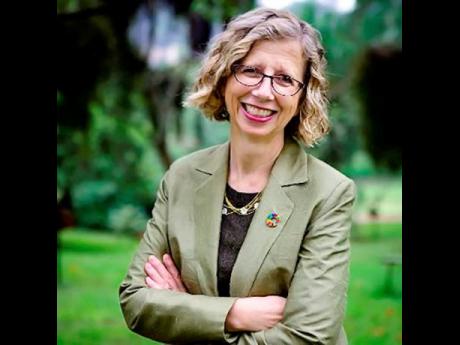Earth Today | Collaborate to be great
UNEP boss notes partnership benefits for humans, planet
THE NEED for collaboration to solve the triple planetary crisis of climate change, nature and biodiversity loss as well as pollution and waste was punctuated at the recent Executive Board Meeting of the World Food Programme (WFP) and has found favour with Jamaican stakeholders.
“In 2019, climate change was linked to the displacement of over 70 per cent of 33 million people; and some estimates indicate that by 2050, climate change could internally displace 216 million people. As the UN Secretary General has said, the climate crisis has escalating implications for international peace and security,” warned Inger Andersen, executive director for the United Nations Environment Programme (UNEP).
“Closely linked is the water challenge. By 2050, an estimated six billion people will face water scarcity due to climate change, pollution and increasingly unsustainable consumption and production. Degradation and loss of land fertility, and associated natural habitats and biodiversity, is another threat,” she added.
“Millions of people are facing extreme hunger and severe food shortages. Hundreds of millions … face hunger every day. Billions … struggle to afford a healthy, balanced diet; and billions of hectares of productive land are degraded. Our productive seas and waterways are increasingly polluted. The estimated annual market value of food dependent on pollinators is over half a trillion dollars. Yet, these pollinators are in decline,” she the UNEP boss said further.
The implications, Andersen said, are varied and dire, including impaired efforts to meet the 2030 Sustainable Development Goals. It will, she said, take partnerships, including between the UNEP and the WFP, to make a difference.
“This perfect storm makes it crystal clear that the mandates of UNEP and WFP are intertwined. We can only calm this storm by investing in the foundations of human and planetary resilience: vibrant and healthy nature and a stable climate,” Andersen insisted.
“Friends, WFP and UNEP are partners that play to each other’s strengths. WFP has the mandate to eradicate hunger and malnutrition and a massive presence on the ground. UNEP has the technical and scientific know-how to secure ecosystems, mitigate and adapt to climate change and create sustainable consumption and production, to generate equitable benefits for people and nature. Together, we can help to break the cycle of hunger, poverty and humanitarian crises through nature-centred, as well as people-centred, solutions,” she explained.
A necessary part of the collaborative response, Andersen said, is a focus on resilience through the adoption of nature-based solutions and ecosystem-based adaptation.
“In partnership, we are developing a Green Climate Fund proposal to enhance integrated land and water resource management in Eastern Equatoria. This will improve the resilience of communities to floods and droughts. And there is no doubt that science-based, data-driven climate services and early warning systems save lives and livelihoods,” she said.
“We need to see more of what is happening in Lesotho, for example, where UNEP and WFP are supporting vulnerable communities to receive access to climate information and forecasting systems. Coupled with local adaptation strategies – such as crop diversification, water harvesting and grassland restoration – this is helping communities build resilience,” Andersen said further.
She has also championed “nature positive, climate-friendly food systems” and integrated water resources management.
Local stakeholders have endorsed her suggestions.
“All of these are critical and it is important to keep reiterating the point though we have heard reference to these before,” said sustainable development specialist Eleanor Jones.
“Here we have UNEP and WFP coming together and they are really emphasising the nexus between nature-based resources, food, climate variability and change and eradication of poverty. This, once again,emphasises that we cannot afford to continue to operate in silos because everyone loses,” added Jones, who heads the consultancy firm Environmental Solutions Limited.
Indi Mclymont-Lafayette, a communication for development pro and gender specialist, said country and other stakeholders must take their cue from UNEP and the WFP.
“It is good to see how WFP and UNEP are collaborating. It provides a good example of what Article 6 of the Paris agreement calls for: achieving ambitious climate action through cooperative approaches,” she noted.
“It is also encouraging to see that some of the priority issues, such as water access as an option to drought management is being addressed. It sends a good message for us in Jamaica and the Caribbean to look at how we can collaborate as organisations in the region to address our climate priorities. We can only do this through key partnerships,” she added.



